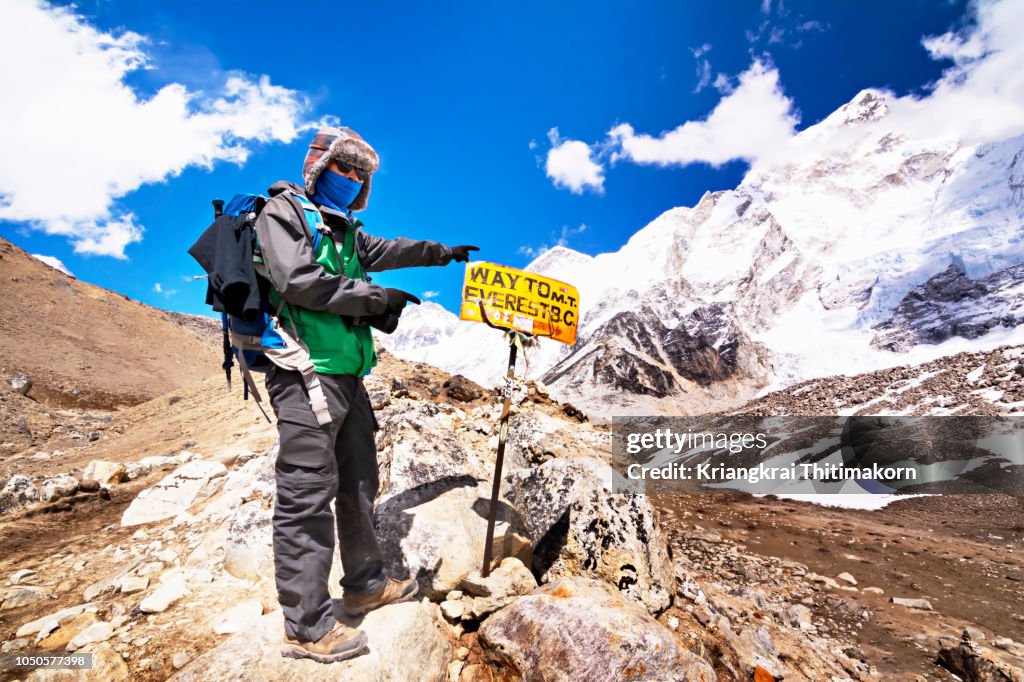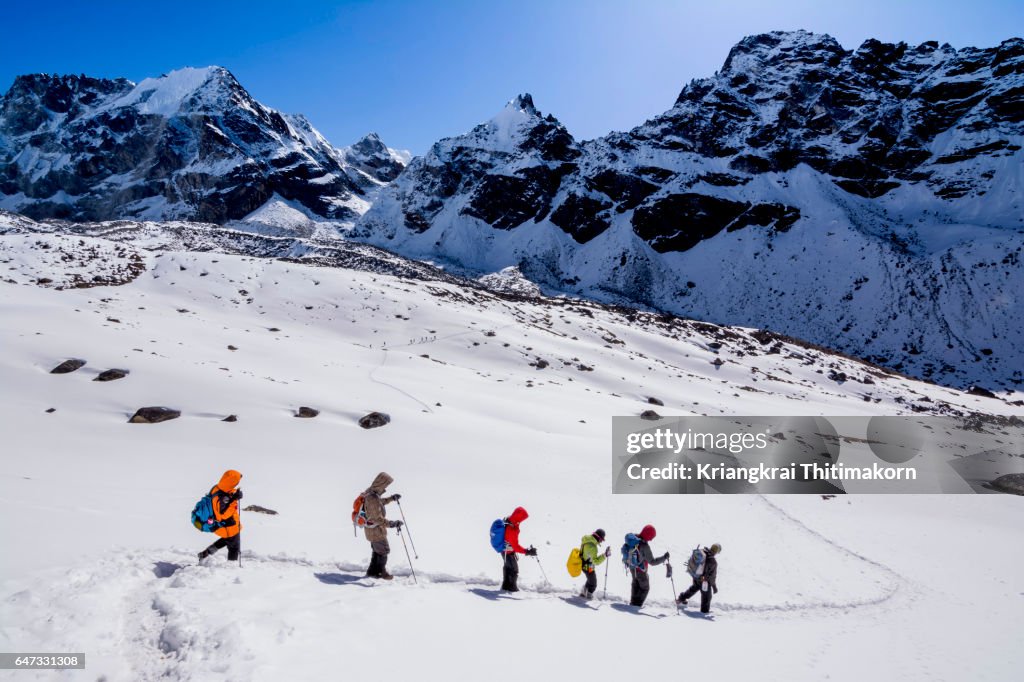The elevation of Everest Base Camp (EBC) is approximately 5,364 meters (17,598 feet) above sea level. Everest Base Camp serves as the starting point for climbers attempting to summit Mount Everest, the highest peak in the world. It is located in the Khumbu region of Nepal, and reaching EBC involves a challenging trek through rugged terrain and high altitude conditions.
Approximately 5,364 meters (17,598 feet)
Everest Base Camp Overview
Everest Base Camp (EBC) is a popular trekking destination situated in the Khumbu region of Nepal. It serves as the starting point for climbers attempting to summit Mount Everest, the highest peak in the world. Even for those who don't aim to reach the summit, trekking to Everest Base Camp offers a unique adventure and an opportunity to experience the stunning beauty of the Himalayas.
Here's an overview of Everest Base Camp:
Location: Everest Base Camp is located in the Sagarmatha National Park in northeastern Nepal. The trek starts from Lukla, a small town with an airport that serves as the gateway to the Everest region.
Altitude: Everest Base Camp itself is situated at an elevation of approximately 5,364 meters (17,598 feet) above sea level. However, during the trek, you will encounter various altitudes, starting from Lukla at around 2,860 meters (9,383 feet).
Trekking Route: The trekking route to Everest Base Camp is a well-established trail that takes you through a diverse landscape, including lush forests, picturesque Sherpa villages, glacial rivers, and high-altitude terrain. The trail passes through famous landmarks like Namche Bazaar (a bustling Sherpa town), Tengboche Monastery (a significant Buddhist monastery), and Khumbu Glacier.
Duration: The duration of the trek can vary depending on the itinerary and individual preferences. On average, it takes about 12-14 days to reach Everest Base Camp and return to Lukla. However, the itinerary can be customized, and some trekkers choose to include additional rest/acclimatization days along the way.
Scenic Highlights: The trek offers breathtaking views of snow-capped peaks, including Everest (8,848 meters/29,029 feet), Lhotse, Nuptse, Ama Dablam, and many others. The iconic viewpoint of Kala Patthar (5,545 meters/18,192 feet) provides a spectacular panorama of Everest and the surrounding mountains.
Culture and Sherpa Hospitality: The Everest region is home to the Sherpa people, renowned for their mountaineering heritage and warm hospitality. Along the trail, you will have opportunities to immerse yourself in the local culture, visit monasteries, interact with Sherpa communities, and gain insights into their way of life.
Facilities and Accommodation: The trekking route to Everest Base Camp is well-served with tea houses, lodges, and guesthouses offering basic accommodation and meals. However, the facilities become more basic and limited at higher altitudes.
Challenges: The EBC trek presents challenges such as high altitude, variable weather conditions, steep ascents and descents, and the risk of altitude sickness. Adequate acclimatization, physical fitness, and proper preparation are essential to overcome these challenges.
Permits: Trekking in the Everest region requires obtaining permits, including the Sagarmatha National Park entry permit and the TIMS (Trekkers' Information Management System) card. These permits can be obtained in Kathmandu or through authorized agencies.
The trek to Everest Base Camp is an adventure of a lifetime, offering stunning natural beauty, cultural experiences, and a sense of accomplishment. It is important to plan well, be prepared, and respect the fragile environment of the region while enjoying this remarkable journey.
Is Everest Base Camp harder than Kilimanjaro?
Comparing the difficulty of Everest Base Camp (EBC) and Mount Kilimanjaro is subjective as they present different challenges.
EBC Trek: The trek to Everest Base Camp involves hiking through high-altitude terrain in the Himalayas. While the trek itself does not require any technical climbing skills, it is physically demanding due to the steep ascents, long duration, and the effects of high altitude. Altitude sickness can be a significant concern, and proper acclimatization is crucial. The weather conditions can also be unpredictable, adding to the challenge.
Mount Kilimanjaro: Mount Kilimanjaro is a standalone peak in Tanzania, known for its accessibility and the absence of technical climbing skills required. However, Kilimanjaro is a much higher mountain than Everest Base Camp, with its summit reaching 5,895 meters (19,341 feet) above sea level. The altitude can pose challenges, and climbers must acclimatize properly to mitigate the risk of altitude sickness. The ascent is typically slower and longer, allowing for proper acclimatization.
In summary, while Everest Base Camp is physically demanding due to high altitudes and variable weather, it does not involve technical climbing. On the other hand, Mount Kilimanjaro is higher in altitude and requires good acclimatization, but it is a non-technical trek. Both experiences have their own unique difficulties, and the choice between them depends on personal preferences, physical fitness, and previous experience with high-altitude trekking.
How hard is it to climb to Everest Base Camp?
Climbing to Everest Base Camp (EBC) is considered a challenging endeavor, primarily due to the high altitudes involved. While it does not require technical climbing skills or mountaineering experience, it still demands physical fitness, mental resilience, and proper preparation.
Here are some factors that contribute to the difficulty of climbing to Everest Base Camp:
- Altitude: The trek to EBC takes you through high-altitude terrain, with the base camp itself situated at approximately 5,364 meters (17,598 feet) above sea level. The reduced oxygen levels at high altitude can cause altitude-related illnesses such as acute mountain sickness (AMS), high-altitude pulmonary edema (HAPE), and high-altitude cerebral edema (HACE). Proper acclimatization and allowing enough time for your body to adjust to the altitude are crucial to minimize the risks.
- Length and duration: The trek to EBC typically takes around 12-14 days, covering a distance of approximately 65 kilometers (40 miles) round trip. The trail involves steep ascents, descents, and varied terrain, including rocky paths, suspension bridges, and moraines. It requires endurance and stamina to handle the long days of trekking and the physically demanding sections.
- Weather and climate: The weather in the Everest region can be unpredictable and harsh. Temperatures can drop below freezing, especially during the night, and weather conditions can change rapidly. It is essential to be prepared for cold temperatures, strong winds, and potential snowfall.
- Basic facilities: Along the trekking route, the availability of basic facilities such as food, accommodation, and medical services can be limited. Tea houses and lodges are available in many villages, but they may have basic amenities and can get crowded during peak trekking seasons. Being prepared for basic accommodation and adjusting to different food options is necessary.
- Physical fitness: Prior physical preparation is advisable to undertake the EBC trek. Regular exercise, including cardiovascular workouts, hiking, and building lower body strength, can help in coping with the demands of the trek.
It is worth noting that while the EBC trek is challenging, it is a popular route with thousands of trekkers completing it successfully each year. With proper planning, preparation, and the assistance of experienced guides or trekking agencies, many individuals can accomplish the journey to Everest Base Camp.
Can a beginner go to Everest Base Camp?
- Physical fitness: Being in good overall physical condition is crucial. It is recommended to engage in regular exercise and cardiovascular activities like hiking, jogging, or cycling to build endurance and stamina. Strength training, particularly for the lower body, can also be beneficial. Gradually increasing your fitness level over time will help you cope with the demands of the trek.
- Acclimatization: Proper acclimatization is essential for tackling the high altitudes of the Everest region. Acclimatization involves ascending slowly, allowing your body time to adjust to the reduced oxygen levels. It is recommended to follow a well-designed itinerary that includes acclimatization days at specific points along the trek.
- Training and preparation: Before embarking on the EBC trek, it is advisable to engage in preparatory hikes and treks of increasing difficulty. This will help you gauge your fitness level, get accustomed to walking with a backpack, and test your gear and equipment.
- Guided trek: It is highly recommended for beginners to undertake the EBC trek with the assistance of an experienced guide or a reputable trekking agency. They can provide valuable guidance, manage logistics, ensure safety, and offer support throughout the journey.
- Mental preparation: Climbing to EBC requires mental resilience and determination. Being mentally prepared for the challenges, including the physical exertion, potential altitude sickness, and variable weather conditions, will help you stay motivated and focused.
- Packing and gear: Investing in suitable trekking gear, including comfortable and sturdy footwear, layered clothing for varying temperatures, a good quality backpack, and other essentials, is important. Packing wisely and being prepared for different weather conditions is crucial for a successful trek.







No comments:
Post a Comment